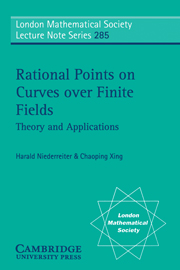Book contents
- Frontmatter
- Contents
- Preface
- 1 Background on Function Fields
- 2 Class Field Theory
- 3 Explicit Function Fields
- 4 Function Fields with Many Rational Places
- 5 Asymptotic Results
- 6 Applications to Algebraic Coding Theory
- 7 Applications to Cryptography
- 8 Applications to Low-Discrepancy Sequences
- A Curves and Their Function Fields
- Bibliography
- Index
3 - Explicit Function Fields
Published online by Cambridge University Press: 05 April 2013
- Frontmatter
- Contents
- Preface
- 1 Background on Function Fields
- 2 Class Field Theory
- 3 Explicit Function Fields
- 4 Function Fields with Many Rational Places
- 5 Asymptotic Results
- 6 Applications to Algebraic Coding Theory
- 7 Applications to Cryptography
- 8 Applications to Low-Discrepancy Sequences
- A Curves and Their Function Fields
- Bibliography
- Index
Summary
In Chapter 2 we have seen how to obtain, in theory, all finite abelian extensions of a global function field F/Fq. In this chapter we are going to construct some of these finite abelian extensions explicitly by considering Kummer and Artin-Schreier extensions, cyclotomic function fields, and Drinfeld modules of rank 1. This is particularly important for determining explicit equations which are satisfied by generators of global function fields.
Kummer and Artin-Schreier Extensions
In this section, two of the most common types of Galois extensions, namely Kummer extensions and Artin-Schreier extensions, are introduced. The advantage of these extensions is that their defining equations can be explicitly expressed. Another advantage is that genera of these two types of global function fields can be easily calculated. A detailed account of the theory of Kummer and Artin-Schreier extensions can be found in the book of Stichtenoth [152, Chapter III]. Thus, we state the results in this section without proof.
Definition 3.1.1 Let n > 1 be an integer. An element f of F/Fq is called nth Kummer degenerate if there exist an element u of F and a divisor d of n such that d > 1 and f = ud. Otherwise, f is called nth Kummer nondegenerate.
If gcd(vp(f), n) = 1 for some P ∈ PF, then f ∈ F is nth Kummer nondegenerate. An extension of the form considered in the next proposition is called a Kummer extension.
- Type
- Chapter
- Information
- Rational Points on Curves over Finite FieldsTheory and Applications, pp. 62 - 75Publisher: Cambridge University PressPrint publication year: 2001
- 2
- Cited by



